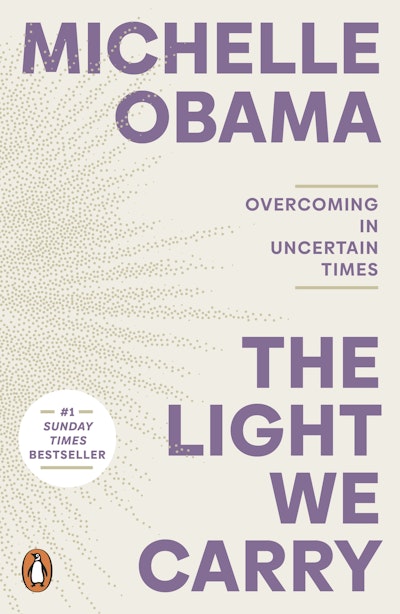- Published: 23 April 2024
- ISBN: 9781405968607
- Imprint: Penguin General UK
- Format: Paperback
- Pages: 336
- RRP: $32.99
The Light We Carry
Overcoming In Uncertain Times
Extract
At some point when I was a child, my father started using a cane to keep himself balanced when he walked. I don’t remember exactly when it showed up in our home on the South Side of Chicago— I was maybe four or five years old at the time— but suddenly it was there, slim and sturdy and made of a smooth dark wood. The cane was an early concession to multiple sclerosis, the disease that had given my father a severe left-legged limp. Slowly and silently and probably long before he received a formal diagnosis, MS was undermining his body, eating away at his central nervous system and weakening his legs as he went about his everyday business: working at the city’s water filtration plant, running a household with my mom, trying to raise good kids.
The cane helped my dad get himself up the stairs to our apartment or down a city block. In the evenings, he would set it against the arm of his recliner and seemingly forget about it as he watched sports on TV, or listened to jazz on the stereo, or pulled me onto his lap to ask about my day at school. I was fascinated by the cane’s curved handle, the black rubber tip at its end, the hollow clatter it made when it fell to the floor. Sometimes I’d try to use it, imitating my father’s motions as I hobbled around our living room, hoping to feel what it was like to walk in his shoes. But I was too small and the cane was too big, and so instead I would incorporate it as a stage prop in my games of pretending.
As we saw it in my family, that cane symbolized nothing. It was just a tool, the same way my mother’s spatula was a tool in the kitchen, or my grandfather’s hammer got used any time he came over to fix a broken shelf or curtain rod. It was utilitarian, protective, something to lean on when needed.
What we didn’t really want to acknowledge was the fact that my father’s condition was gradually growing worse, his body quietly turning on itself. Dad knew it. Mom knew it. My older brother, Craig, and I were just kids at the time, but kids are no dummies, and so even as our father still played catch with us in the backyard and showed up at our piano recitals and Little League games, we knew it, too. We were starting to understand that Dad’s illness left us more vulnerable as a family, less protected. In an emergency, it’d be harder for him to leap into action and save us from a fire or an intruder. We were learning that life was not in our control.
Every so often, too, the cane would fail our father. He would misjudge a step, or his foot would catch a lump in the rug, and suddenly he’d stumble and fall. And in that single freeze-frame instant, with his body in midair, we would catch sight of everything we were hoping not to see— his vulnerability, our helplessness, the uncertainty and harder times ahead.












